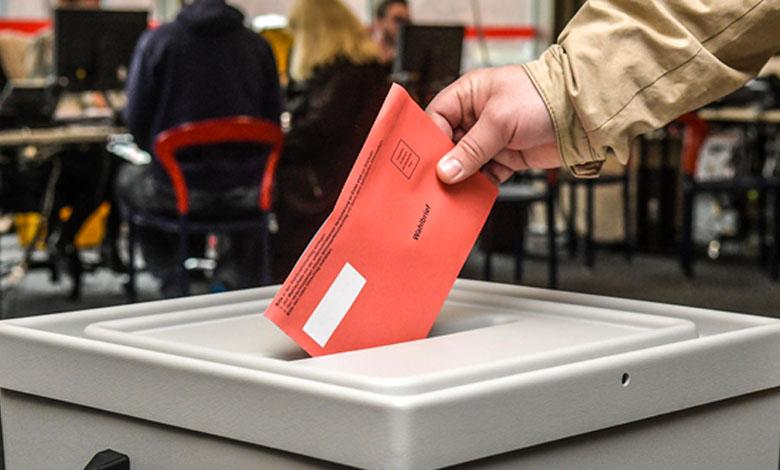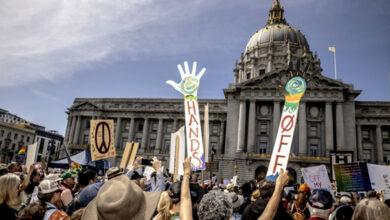Elections in Germany: Kyiv is preparing for the worst-case scenario

Tomorrow, February 23, 2025, Germany will hold early parliamentary elections that may significantly affect its domestic politics and international relations. These elections have become inevitable after the collapse of the coalition government of Olaf Scholz in November 2024, caused by bitter disputes over budgetary policy and a growing economic crisis. According to the last ones surveys, the Christian Democratic Union (CDU) led by Friedrich Merz leads with around 31% voter support. The far-right Alternative for Germany (AfD) comes in second with 19%, ahead of the Social Democratic Party of Germany (SPD). Her growing popularity is causing concern among Western politicians due to the threat of radicalization of the political landscape and a possible revision of Germany’s foreign policy course.
As you know, Germany occupies an important position among the countries that help Ukraine, second only to America in terms of support. Cooperation between Berlin and Kyiv covers financial, humanitarian and military aid, as well as joint projects in the energy sector and infrastructure restoration. The results of these elections can affect on further support for Ukraine, as different parties have different positions on foreign policy and military aid.
The election comes amid an economic recession and debate over immigration policy, adding uncertainty to the country’s future political course. European Union and international investors beware are watching as the results of the vote may affect the economic stability and political unity of Europe.
Early elections due to the crisis
In November 2024, Germany faced a political crisis when the ruling coalition collapsed for the first time in 75 years. The government was led by the Social Democratic Party (SPD), led by Chancellor Olaf Scholz, and the coalition also included the Green Party, represented by Vice-Chancellor Robert Habek and Foreign Minister Annalena Berbock, and the Free Democratic Party (VDP), led by Christian Lindner.
One of the key reasons for the political split was the dismissal of Lindner from the position of finance minister, which caused an internal crisis and made the further functioning of the coalition impossible. As a result, President Frank-Walter Steinmeier announced the dissolution of parliament on December 27, 2024 and called early elections for February 23, 2025.
Political tension between the parties escalated after a Constitutional Court ruling barred the government from diverting unused funds originally earmarked to fight the COVID-19 pandemic to other needs. Chancellor Olaf Scholz and Vice-Chancellor Robert Habek sought to use these financial reserves to implement development programs, while Finance Minister Christian Lindner insisted on a “debt brake” that limited the government’s ability to take out new loans in peacetime.
An additional factor in the crisis was Russia’s full-scale invasion of Ukraine, which caused a sharp rise in energy prices and forced the government to review defense spending. Scholz insisted on temporarily relaxing the “debt brake” and attracting additional financial resources, while Lindner was in favor of reducing social costs and maintaining strict budgetary discipline. This fundamental difference in approaches to financial policy became one of the key factors in the collapse of the coalition.
Elections under the legislation that “cuts off” the Bundestag
In 2023, Germany introduced electoral reform aimed at optimizing the work of the Bundestag and reducing its size. According to the Constitution, the parliament should consist of 598 deputies, but due to the peculiarities of the electoral system — double voting, on two ballots — their number increased to 736 in the 20th convocation. This complicated the work of the parliament and reduced the weight of each individual vote in decision-making.
The fact is that the German electoral system is traditional combines majoritarian and proportional components. Each voter casts two votes: the first for a specific candidate in a single-mandate district, the second for a party list. The distribution of seats in the parliament is determined mainly by the results of voting on party lists, provided that the party overcomes the 5% barrier.
Previously, if a party received more seats in single-member constituencies than it was entitled to under proportional distribution, other parties received additional seats to maintain proportionality. This led to an increase in the total number of deputies. Reform of the electoral system limited the number of seats in the Bundestag to 630, introducing a mechanism whereby direct mandates are allocated only when they correspond to the share of votes received by a party on the lists. In addition, the rule that allowed a party that did not overcome the 5% barrier, but received three mandates in single-mandate constituencies, to form a faction in the parliament, was canceled. These changes are aimed at improving the efficiency of the parliament and ensuring a fairer representation of voters.
In total, the country is divided into 299 electoral districts, each of which covers approximately 250,000 inhabitants.
Order of parties in the ballot depends from the results of the previous elections in 2021. In Berlin, SPD, Grüne, and CDU are in first place, followed by Die Linke, AfD, and FDP. Instead, the newly formed association of Sarah Wagenknecht (BSW) is only in 16th place.
Economic difficulties significantly affect Germany’s domestic and foreign policy, especially in the context of support for Ukraine. Various options for coalitions — from the “Grand Coalition” between the CDU/CSU and the SDP to a possible alliance with the “Greens” — will determine the level of support for Ukraine, particularly in the military sphere and the transfer of long-range missiles. Since the CDU/CSU is currently leading the polls, their candidate, Friedrich Merz, is likely to become the new chancellor. The parties CDU/CSU and Union 90/Greens can support an increase in defense spending from 2% to 3.5% of GDP, which is considered important for strengthening European security and aid to Ukraine. At the same time, the right-wing populist AdN party is likely to oppose spending increases and prioritize fiscal discipline, which will complicate the revision of public debt policy.
In addition, the issues of reducing the use of Russian liquefied natural gas and the transfer of frozen Russian assets are important for Ukraine. Changes in the positions of countries such as Belgium, France, Spain and the Netherlands may affect decisions on LNG. Since a new government is being formed in Germany, this opens up new opportunities for advancing the issue of frozen Russian assets in favor of Ukraine.
How the elections in Germany will affect Ukraine
Economic difficulties currently have a significant impact on the political course of Germany, in particular, this also applies to support for Ukraine. Its level will determine the formation of a new coalition, which will relate to cooperation in the military sphere and the issue of the transfer of long-range missiles. Among the possible scenarios, both the “Grand Coalition” with the participation of the CDU/CSU and SPD, and the alliance with the “Greens” are considered.
Since the CDU/CSU bloc is currently leading the elections, their candidate Friedrich Merz has a good chance of leading the government. In the case of a coalition between the CDU/CSU and the Greens, a decision may be made to increase defense spending from 2% to 3.5% of GDP, which will contribute to strengthening European security and expanding aid to Ukraine. At the same time, the right-wing populist “Alternative for Germany” (AdN) is likely to oppose such changes, emphasizing the observance of fiscal discipline and the limitation of public debt, which may complicate decision-making in this direction.
For Ukraine, the issue of reducing dependence on Russian liquefied natural gas and the possibility of transferring frozen Russian assets also remains important. In this context, the position of countries such as Belgium, France, Spain and the Netherlands can influence the adoption of relevant decisions. The formation of a new government in Germany opens up new opportunities for the promotion of these initiatives at the European level, which can have significant consequences for our country.
What can we expect from Mertz?
Friedrich Merz, the leader of the Christian Democratic Union (CDU) and candidate for chancellor of Germany, has repeatedly spoken out in support of Ukraine. In December 2024, during a visit to Kyiv, he stated on support for providing Ukraine with long-range weapons capable of achieving military goals on the territory of Russia. In January 2025, at an event in Berlin, Merz promised, that ending Russia’s war against Ukraine and achieving peace will be among the top priorities of his government if he becomes chancellor.
At the same time Mertz expressed concerns about US President Donald Trump’s statements about Ukraine, calling them “classic substitution of the criminal for the victim” and “Russian narrativeHowever, in December 2024, Mertz did too statedthat sending German peacekeepers to Ukraine requires “an uncontested mandate under international law“, and expressed the wish that this mandate be agreed with Russia.
In addition, Mertz offered to change the policy regarding the provision of Taurus cruise missiles to Ukraine, offering to transfer them to Great Britain in exchange for the supply of Storm Shadow missiles to Ukraine.
Regarding Ukrainian refugees, Merts expressed opinion about the need to reduce social assistance by transferring new arrivals from “assistance for citizens“for assistance provided by the law on assistance for political asylum seekers.
In general, Friedrich Mertz’s position regarding Ukraine is characterized by support in the military sphere and the desire to achieve peace, but it contains certain controversial points, in particular regarding the participation of German peacekeepers and social assistance to refugees.
A party under the supervision of special services
Alternative for Germany – a right-wing populist and Eurosceptic party that, despite numerous scandals, has recently significantly strengthened its position in German politics – raises many questions among Western politicians. If it gains significant representation in the Bundestag after early elections, this could have serious consequences for both Germany’s domestic politics and its international commitments, particularly with regard to Ukraine.
It is known that AdN opposes military aid to Kyiv and promotes the idea of establishing relations with Russia. Its representatives regularly call for a reduction in support for Ukraine, an end to the supply of weapons, and even the lifting of sanctions against the Russian Federation. The growing influence of this party could complicate decisions about military aid and further sanctions.
The party criticizes European integration and advocates weakening the influence of Brussels on German national politics. The growth of its influence can undermine the stability of the European Union, which plays into the hands of Moscow and other opponents of European unity.
AdN is known for its radical rhetoric, which includes anti-immigration and nationalist politics. It is already under surveillance by the Federal Office for the Protection of the Constitution as a potentially extremist political force. Its passage to the Bundestag in strong positions may contribute to the radicalization of the political discourse in the country.
AdN representatives have repeatedly demonstrated pro-Russian views, advocating the lifting of sanctions and the restoration of economic ties with Moscow. Some of them even visited the temporarily occupied territories of Ukraine, which calls into question their loyalty to democratic values. In the case of significant representation of this party in the parliament, the political course of Germany may change significantly in favor of the Kremlin.
AdN opposes increasing defense spending and modernization of the Bundeswehr, which could slow down the process of strengthening European security. This could become a serious obstacle to further support for NATO and the EU’s defense initiatives.
Considering these factors, the growing popularity of AdN poses serious challenges both for Germany’s domestic politics and for European security in general. Her pro-Russian rhetoric and anti-Ukrainian statements make her one of the most dangerous political forces in the contemporary German political landscape.





